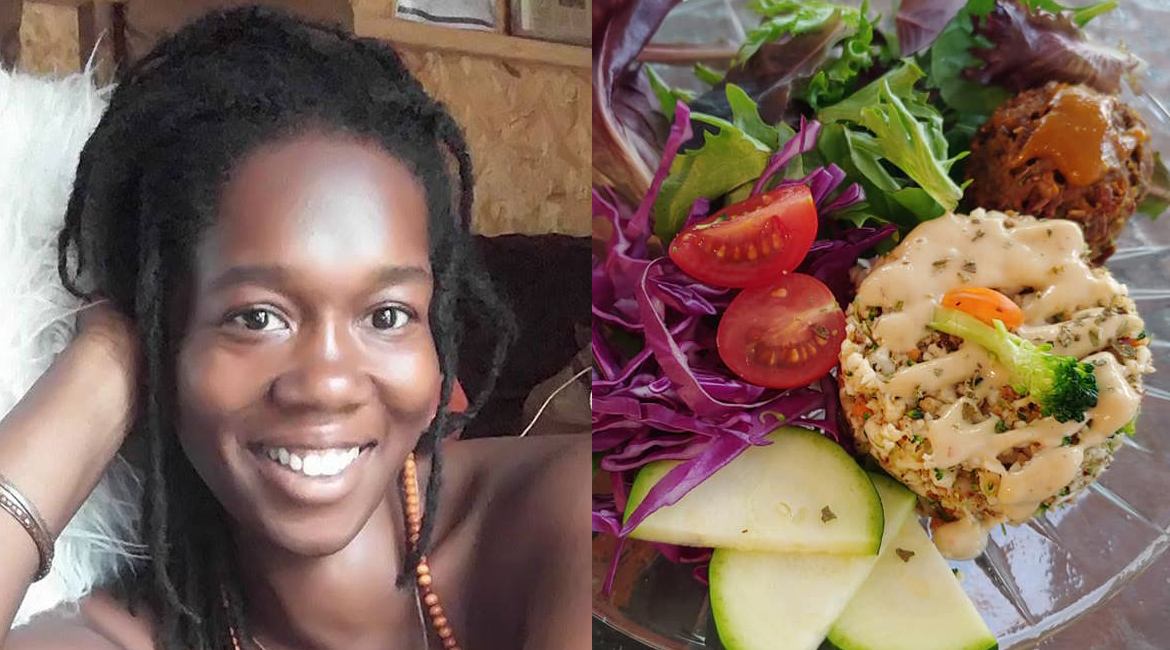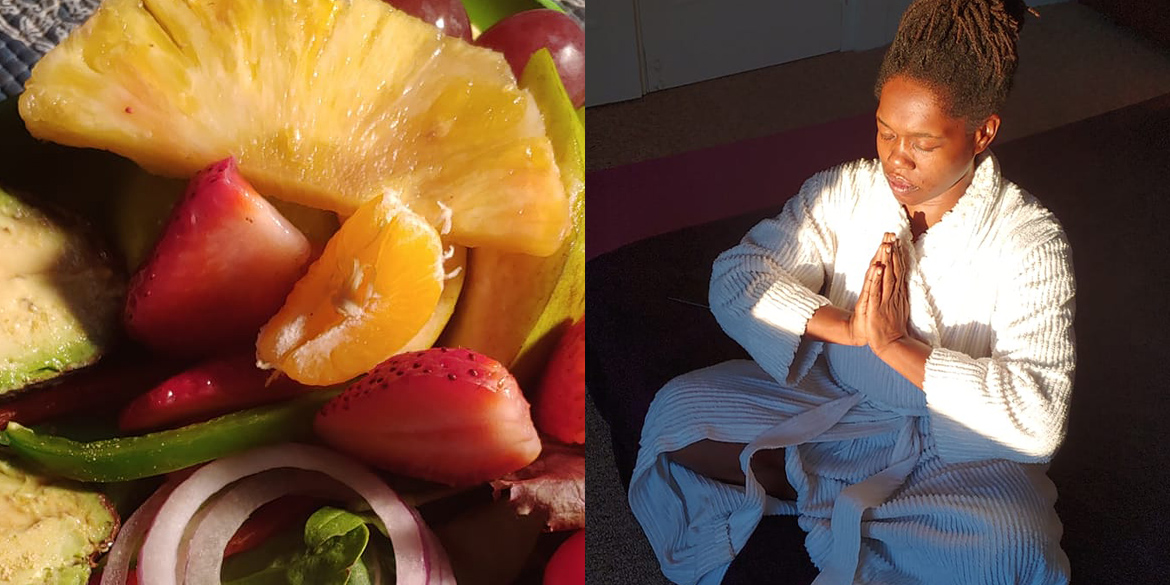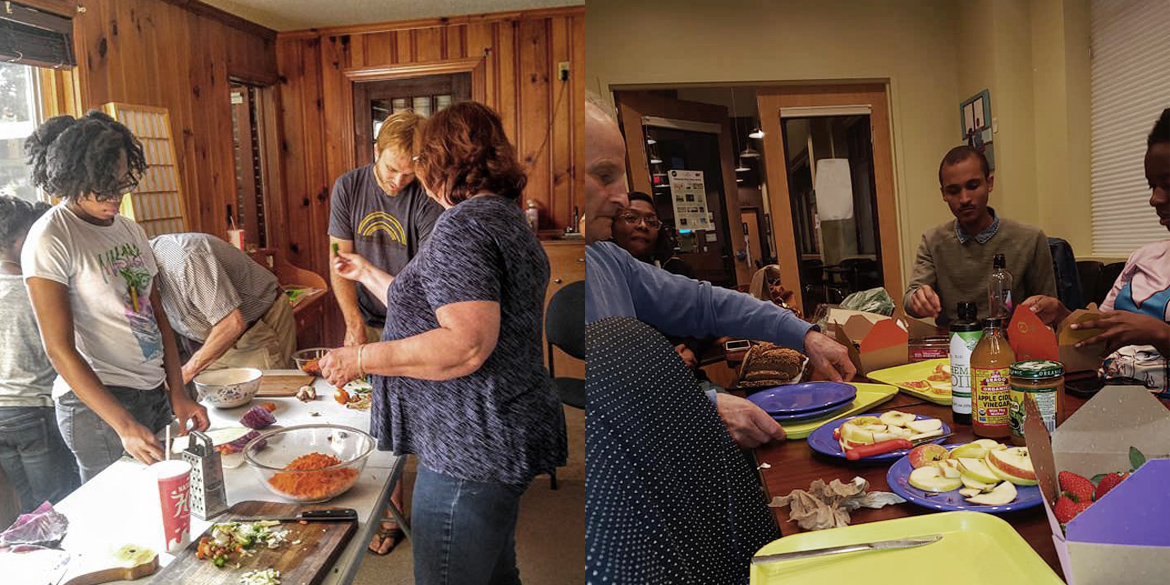Deep Roots: Communities of Color and the Plant-Based Movement

When Tinece Payne encounters someone who’s skeptical about plant-based eating, she just invites them to dinner at Healing Springs Farmacy, the nonprofit holistic health center she founded in Greensboro, North Carolina. “We have potlucks, and the food is delicious — that’s something that always gets people coming back,” she says.
Payne, also known as Earth Feathur, is a certified reiki master, holistic healer, and yoga teacher, and she’s a leader in North Carolina’s growing community of African American vegans. While plant-based eating is often seen as a lifestyle for privileged, white communities, Payne notes that it actually cuts across many food traditions, and has deep roots in Black history. “People think this is just for high-class white people,” she says. “No — our plant-based diet has been part of our lifestyle since the beginning of time.”

Tinece has been an advocate for plant-based, holistic practices for years, embracing it fully into her lifestyle and sharing with others in her community.
The concept of “soul food” is based on the cheap cuts of meat and offal that constituted slave rations on American plantations, she argues. “It’s a diet that’s been passed down through slavery and people being fed scraps,” she says. “People think ‘because my grandfather or grandmother ate chitlins and pigs feet, I’m going to have it too.’ We’re trying to change that.”
Referencing the Kemet culture, or the black people of ancient Egypt, she notes that traditional African diets centered around grains, vegetables, and fruits, while the slaughter of animals was reserved for priests on ceremonial occasions only, she says. “We’re returning to our natural selves and not being colonized. We’re putting an end to the slave mentality.”
Economics are another reason for the rise of plant-based eating in people of color, she notes. “When we look a the cost of eating, there are people unable to afford meat, and that’s also been a factor why veganism has stuck with people,” she says. While some were concerned that healthy food was more expensive, with education they learned that it was actually a better investment over time, she says.
Modern-day Black veganism began its revival in the 1960s and 70’s, through leaders and teachers like Artis Hinson and Dr. Sebi, the herbalist and healer who advocated an alkaline, plant-based diet.

Leeks, emmer wheat and figs were common foods in ancient Egypt.
An Associate Professor of History at the University of North Texas and food history expert, Jennifer Jensen Wallach writes about the paradigm shift in the south during the Civil Rights era and the weight sit-ins carried in the psyche of the Black diaspora, “If hamburgers and Coca-Colas had — during the era of the sit-ins — been interpreted as symbols of citizenship denied, the renunciation of these items could later be understood as citizenship rejected.
Wallach explains, “Radical food reformers analyzed white-owned eating establishments and dominant American foodways in opposition to southern, regional cuisine and in contrast to a vegetarian-inclined diet…
There is also a strong connection between veganism and the civil rights movement. Black nationalist eaters could avoid meat as a way to demonstrate their rejection of the structure of white supremacy, which had been built on domination and violence. By consuming food produced by and for black people, radical food critics could distance themselves from American consumer capitalism.”
But eating plant-based has seen more growth in the past decade, Payne says, as social media made it easier for communities of color to share information about plant-based eating, and young Black people began seeing older generations struggling with diet-related health problems like diabetes and heart-disease. “We’re seeing more and more people doing pot lucks and getting back to the old way of sitting down at the table and sharing a meal together,” she says.
Concern for the environment is another reason people of color are turning to a plant-based lifestyle in North Carolina, she says. With a higher concentration of industrial pig farms in eastern North Carolina than anywhere else in the country, problems like water and air pollution are becoming major health and quality-of-life issues in the Black communities nearby. And the spread of animal agriculture is causing similar issues on a global scale, she notes. “If we don’t stop at the rate we’re going, we’re not going to have a planet,” she says. “When you eat meat the way America does, we’re not going to have anything left for anyone.”

Tinece is a place-maker, hosting events and opportunities to enjoy plant-based foods for her community.
But for many people in Payne’s community, health and wellness are the motivation to go plant-based. “I tell people, ‘Your health is your wealth,’” she says.
When a friend is trying plant-based eating for the first time, Payne likes to give them her recipe for fried tofu — a dish that easily substitutes for traditional regional comfort foods like fried chicken or fish. While she knows it’s not healthy to eat fried foods regularly, starting with something familiar helps people make the transition, she says.
It’s all part of her message of inclusion, and her goal to introduce more people to plant-based eating, not by shaming them, but by inspiring.
“All people, no matter who you are, you can eat this way,” she says. “It’s not a black thing or a white thing, it’s a people thing, a planetary movement that needs to happen.”
What's Next?
OMD has a pilot program in North Carolina aimed at increasing access to plant-based foods on restaurant menus and school lunch programs in the state. Visit here to learn more.


